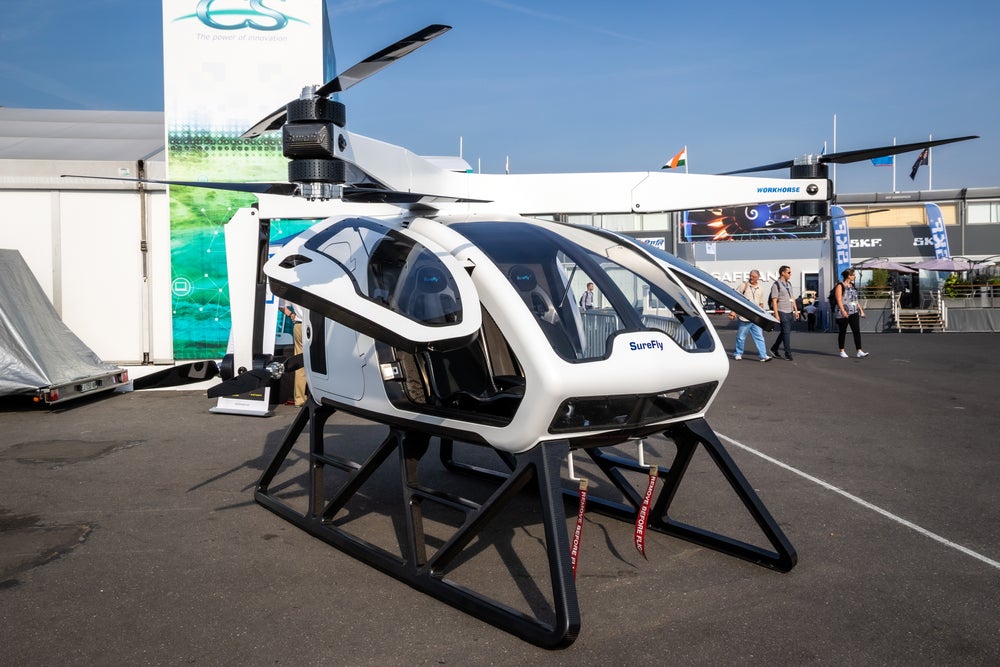The future of urban mobility could be revolutionized by electric vertical take-off and landing vehicles (eVTOLs).
Technological advances and government support are bringing eVTOLs to the fore. EVTOL companies are focusing on overcoming existing hurdles and showcasing the benefits of their products in the increasingly congested realm of urban transportation. The successful integration of them into urban airspace will require significant infrastructure development.

US Tariffs are shifting - will you react or anticipate?
Don’t let policy changes catch you off guard. Stay proactive with real-time data and expert analysis.
By GlobalDataThe global eVTOLs marketplace will be established by 2030
EVTOLs are designed to take off and land vertically, using rotors or propellers like a helicopter, but are powered by electric motors instead of combustion engines. They fall under the field of advanced air mobility (AAM) and are viewed as a solution to urban congestion and transportation challenges. The global marketplace for eVTOL aircraft will be established by 2030 and will be competitive and accessible by 2035. As the focus on sustainable mobility increases, the mobility industry will see growing investment in them.
Competition in the industry is intense, with companies competing to be the first to launch commercial services and grab market share. Technological progress, regulatory approvals, partnerships with infrastructure providers, and investor funding are driving the industry competition.
Groupe ADP and German-based Volocopter have partnered to bring eVTOLs to the 2024 Paris Olympics. These aircraft will be made available to the public as part of the city’s existing public transport system. This will make Paris the first city in Europe, and possibly the world, to offer commercial eVTOLs. Similarly, California-based Archer Aviation, a specialist in air taxis, aims to start eVTOLs operation in Abu Dhabi and Dubai by 2025.
EVTOL companies are focused on addressing challenges such as battery technology, safety regulations, noise reduction, and infrastructure development to integrate the vehicles into urban transportation systems successfully. As the industry continues to evolve, more collaboration and competition among innovators will gain momentum.
There are a host of environmental challenges associated with eVTOLs
One of the main environmental challenges for eVTOLs is the energy consumption required for operation. While eVTOLs are powered by electric propulsion systems, the source of electricity used to charge their batteries can have environmental implications depending on how it is generated. If the electricity comes from fossil fuel-based power plants, it can contribute to carbon emissions and air pollution.
Moreover, the production and disposal of batteries used in eVTOLs can pose environmental challenges. The mining of raw materials for batteries, such as lithium and cobalt, can have negative environmental impacts, including habitat destruction and water pollution. Additionally, the disposal of batteries at the end of their lifecycle can lead to waste management issues if not properly handled.
EVTOLS could reduce greenhouse gas emissions and air pollution
EVTOLs have the potential to reduce greenhouse gas emissions and air pollution when compared to traditional aircraft powered by fossil fuels. By using electric propulsion systems, the craft can help mitigate the environmental impact of aviation and contribute to efforts to combat climate change. EVTOLs offer a sustainable and efficient mode of transportation for short-distance trips within urban areas. EVTOLs could help reduce the reliance on cars and contribute to a more sustainable urban mobility ecosystem in the long run.
While eVTOLs present some environmental challenges related to energy consumption and battery production, they offer significant environmental benefits in terms of emissions reduction, and sustainable urban mobility.
Successful integration demands infrastructure development
The successful integration of eVTOLs into the urban airspace will require significant infrastructure development, including vertiports for take-off and landing, charging stations, and air traffic management systems to ensure safe and efficient operations.
Despite the challenges—like regulations, infrastructure development, and public acceptance—the continued innovation of the craft is the first step towards shaping the future of urban transportation.










